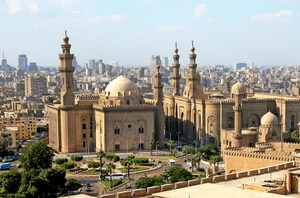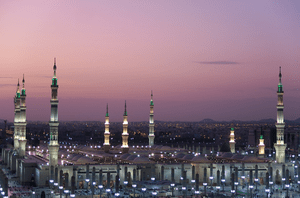Social media has transformed our way of life. While social media may offer some benefits, research has shown that regular use of social media causes mental health problems, addictions, lower attention spans, physical health problems, poor sleep quality, relationship problems and more. However, the most harmful effect of social media is on our hearts and our relationship with Allah (ʿazza wa jall).
Today, one of the biggest obstacles in our journey to Allah is social media and the entertainment industry. Thus, before the month of Ramaḍān begins, it is vital that we reassess our relationship with social media and reflect on its harms. Ramaḍān is the month in which we should undertake a much needed ‘detox’. Psychologists are now advocating ‘fasting from social media’. If we could do the same in this month for our spiritual health, our Ramaḍān would truly be transformative.
The following are some of the key harms of social media and practical solutions we can take to protect ourselves:
1. Time waster & addiction
Social media is the biggest thief of our time. Millions of dollars have been spent on designing social media platforms to ensure that we become addicted to them, using psychological and behavioural techniques such as infinite scrolling, instant gratification, personalised algorithms and constant notifications. These platforms distract us from our goals, hinder us from our social and familial responsibilities, and reduce our ability to focus. Our worship, such as ṣalāh, dhikr and seeking knowledge, is particularly impacted, and we struggle to maintain it for any significant duration.
Solution: As Muslims, every moment of our lives is precious and we must use our time consciously, wisely and productively, especially in Ramaḍān. Therefore, try to detox from social media completely. Otherwise, reduce it to the bare minimum: have a set ‘window’ in which you allow yourself to catch up on it, rather than just saying ‘I’m going to reduce it.’ For example, ‘I will use social media for twenty minutes after ifṭār.’ Deactivate all social media apps and remove them from your phone. You can also use free apps or plug-ins on your browser that restrict the limit on when and for how long you can use social media.
Similarly, don’t waste your time arguing pointlessly online. Al-Awzā’ī (raḥimahullāh) said, “When Allah intends evil for a people, He makes them busy with arguing, and prevents them from (real) action.”
2. Gazing at haram
Social media platforms are full of ḥarām and harmful imagery. It’s common to see enticing pictures and videos of evil acts and the opposite gender. Gazing at ḥarām is a poison which leads to the darkness of the heart and stops us from tasting the sweetness of īmān and worshipping Allah. Along with lowering our gazes from anything which incites lust, we should also avoid looking at the glitz and glamour of the world, as this makes our hearts attached to the world.
Solution: We have to protect ourselves from all ḥarām, including looking at that which is ḥarām. Similarly, we should ensure that we are not posting anything which can be a source of temptation for another person. Ramaḍān is the time to end any ḥarām interactions with the opposite gender and unfollow any account that is harmful or not beneficial to your spiritual and mental wellbeing.
3. Backbiting, slander & lying
It is common for people to criticise others or talk badly of others on social media, even sometimes under the guise of ‘daʿwah’. It is not just the person who backbites that is sinful. Even the one who is listening or reading is sinful as he is complicit in spreading negativity and harm to others.
If what was shared was not even true (and as an observer you are unlikely to know whether it is true or not), then it falls under the extremely dangerous major sin of slander. Spreading false information can have serious consequences for individuals, communities, and the Ummah at large.
Backbiting, slandering and lying are major sins which should not be taken lightly. Each has disastrous consequences in this world and the hereafter.
Solution: Do not spread or share negative information about others. Before posting anything, consider if it is necessary and respectful to share. If you have a concern, speak directly to the person involved, with the correct etiquette. If you are following someone who is speaking badly or negatively of others, unfollow that person. If you want to share information about an event/topic, verify it is correct before you share it, otherwise don’t share it.
The Prophet ﷺ was once shown the horrific punishment of a man lying flat on his back and another man standing over his head with an iron hook. (The man standing) would put the hook in one side of the man’s mouth and tear off that side of his face to the back of his neck, and (he would tear) his nose from front to back, and his eye from front to back. Then he would turn to the other side of the man’s face and do just as he had done with the other side. He would hardly complete this side when the other side would return to its normal state. Then he would return to it to repeat what he had done before. The Prophet ﷺ was told that this was the punishment for a man who goes out of his house in the morning and tells lies that are spread all over the world (Bukhārī).
4. Public sins & justifying sins
Immorality and sin have been normalised and even glamourised on social media. Actions that were taboo and socially unacceptable a mere half a century ago, even amongst non-Muslims, are now commonplace for both non-Muslims and Muslims alike. Sins are no longer considered matters that one should be ashamed of; something which must be kept between oneself and Allah (ʿazza wa jall). Many of us brazenly expose our sins through online platforms seen and read by tens of thousands of users.
The Prophet ﷺ said, “Everyone from my Ummah will be forgiven except those who publicise their sins” (Bukhārī).
Openly sinning not only shows your contempt for the dīn, but encourages others to sin too. Do you want to be carrying the burden of other people’s sins? What is even more lethal is the ever-increasing number of ‘Muslims’ who try to ‘justify’ or make ‘ḥalāl’ what Allah (ʿazza wa jall) has clearly made ḥarām.
Solution: Do not share any of your sins (however ‘minor’ they may be) in public and on social media. Instead keep your sins secret between you and Allah as far as possible and ask Allah al-Ghafūr (The Most Forgiving) to forgive you. If you have already shared sins on social media, go through your account and delete them immediately. Never ever justify committing a sin; admit your weakness and ask Allah to forgive you.
5. Riya (showing off) & arrogance
The opposite of ikhlāṣ (sincerity) is riyā (showing off/ostentation) and sumʿah (seeking fame), both diseases of the heart. In an era of social media and constant ‘sharing’, we are more susceptible to riyā’, as we focus on impressing the watchful gaze of our followers instead of being watchful of the Gaze of Allah, al-Muhaymin (The Vigilant). We feel pressured to ‘share’ everything, including our good deeds. This leads us to doing good deeds for others (riyā’) instead of doing it for the sake of Allah. It also leads to self-admiration (ʿujb) and pride (kibr) because the constant validation and attention received through likes, comments, and followers can contribute to an inflated importance of one’s inner self (nafs) and a sense of superiority over others.
Likewise, if we are involved in seeking knowledge and daʿwah, we are more vulnerable to shayṭān’s attempts to pollute our efforts with riyā’.
Solution: In order to avoid the trap of riyā, we should not share things unnecessarily — it must be useful and purposeful. We must constantly guard and renew our intentions for sharing good content. We should be humble and modest in our interactions with everyone, and we should always ask Allah (ʿazza wa jall) to grant us sincerity and humility.
True servitude to Allah (ʿubūdiyyah) requires us to diminish our self-importance and venerate Allah (ʿazza wa jall). We must think the highest of Allah and be in awe of His greatness, while thinking of ourselves as insignificant. We will only become true servants of Allah if we avoid actions and situations which inflate our ego.
6. Envy
Gone are the days where we could only envy those whom we saw. Thanks to social media, we have access to the little details of millions around the world. This often leaves us feeling envious of lifestyles we see others enjoying, but we ourselves cannot access. Even though we know that images are heavily filtered and present a distorted image of reality, this does not stop our hearts from feeling envy.
Sometimes the feeling of envy (ḥasad) creeps up on us without us realising. If we fight back against it, we will be rewarded. However, if we act upon this feeling, and allow it to eat up our insides, then this is ḥarām and it ruins our good deeds. Envy can be deadly: it leads to hatred and tension, tears down relationships and breaks families. Likewise, we are also responsible for ensuring that we do not inadvertently cause others to feel envious of us, so we should be mindful of what we share.
Solution: Ramaḍān is a month to detox from social media to combat negative effects of seeing profiles and updates from ‘photoshopped’ lives, such as ungratefulness, selfloathing, and depression caused by envy. To combat envy, stop following people who you are likely to feel envious of. Reflect on Allah’s blessings and remember that He is The Most Just (Al-ʿAdl). Consider that the person you are envious of may have ten problems for every one blessing you see. Similarly, protect yourself and your family by not sharing your personal life or triumphs on social media at all.
The Messenger of Allah ﷺ said, “Resort to concealing the fulfilment and success of your needs, for verily every one endowed with a blessing is envied” (Ṭabarānī).
In summary, as Muslims we must be consciously mindful of the various dangers of social media on our hearts, our spiritual wellbeing and our connection with Allah (ʿazza wa jall). This Ramaḍān, if you can undertake a complete social media detox, do that. Otherwise, put in place strict measures to control your social media use.
May Allah al-Ṭayyib (The Pure) purify us from our addictions, liberate us from the prison of ‘social media’, and attach our hearts to Him.






